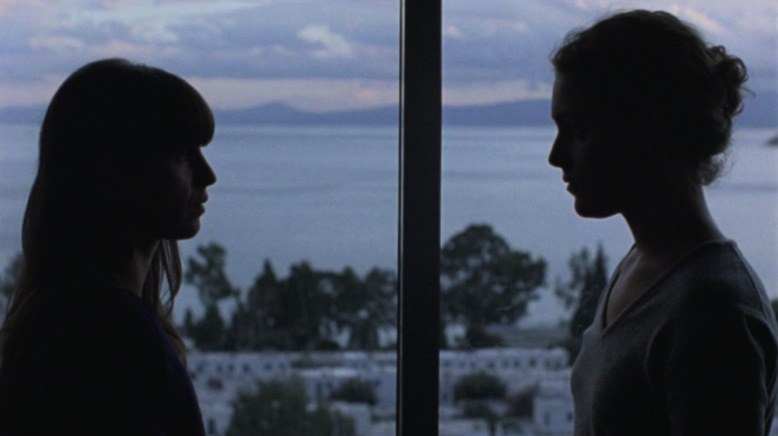Get Ready as a Player
Reflexivity of Games for Coming-of-age Narratives in Dogtooth and Attenberg
In the Greek films Dogtooth (Lanthimos, 2009) and Attenberg (Tsangari, 2010), both of the protagonists experience a transition from “not ready” to “ready” for being on their own through the coming-of-age narratives: for the elder daughter to get out of the enclosed household into the real world outside; for Marina to cope with the impending death of her father and become adequate to romantic interactions with others. The moment of entering into maturity or establishing individual identity may divide their life as a milestone, but long before getting ready to think independently and interact properly, they have started playing games while acquiring more knowledge and experiences as time goes by, which providentially marks and emblematizes their quests and stages in life.
Unlike classical narrative cinema, both of the films are not seamlessly driven by plots; instead, they comprise a scatter of activities that establish the themes as microcosms of the protagonist’s transformation. InDogtooth, the three children are told by their parents if they don’t behave well, the mother will give birth to another boy and girl soon, and indubitably a dog as well. In contrast to the ostensible solidity of such claim, it is revealed previously when the couple proposes different numbers and genders for this pregnancy news that the birth prophecy here is more metaphorical for the present than factual for the future: the son and the younger daughter, as “the two children”, and the elder daughter, as “a dog”, perceive information and act accordingly before getting outside the household, as they were in mother’s womb. In fact, throughout the film, the games played and practiced by the children have provided psychoanalytic insight into a pre-birth mode normally explanatory for their cognitive method. For instance, the children, though physically grown up, are mentally conditioned to limit their available senses and, instead, only utilize tactility to make decisions in the blindfold searching games with the mother as the destination for them to gather around. Similar to the sound but ignorant babies in mother’s womb, the children are physically protected without access to outside information before getting ready to exit the shelter. Aquatic activities in the bathroom and at the swimming pool recur as another reflection of their mental state: they play endurance game underwater or dive into water under the father’s instruction and hold their breaths to stay inside, as what babies presumably do in the mother’s womb before birth. Corresponding to the extensive use of J-cuts and L-cuts, the game scenes in Dogtooth externalize the ideologically conned characters’ temporal stagnation as they are entrapped in a fetus state.
Similarly, the interactive games in Attenberg pinpoint and perpetuate the protagonist’s dilemma: when and how to cross interpersonal boundaries in order to live along with others. A long pan crosses different pairs of players on the tennis courts when a recurrent song plays in the background: “like the boys and girls of my age, I will soon know what love is... without fear of tomorrow...” (Attenberg, 2010) Tennis, as an exercise of initiating, accepting or rejecting between individuals, alludes to the alignment and separation inherent in love and death—two puzzles that unsettle and perplex Marina all the time. Despite her discomfort with the potential start of romantic partnership and ending of familial bonding with her father, Marina has been preparing for these changes in relationship through the company and guidance of Bella, who not only coaches her on her side, but also trains her by simulating action of an opponent. Indeed, in the first half of the film, Bella is mostly framed on the same side with Marina, i.e. them walking down the street in synchronicity or appearing on the same side of the window frame. After the awkward encounter with the engineer, Marina is shown to be playing tennis with Bella but often fails catching or sending back the ball: her difficulty in playing the interactive game smoothly embodies her inexperience in communicating feelings with others. Though tennis has only directly appeared for limited times, its form and element have extensively applied: in another conversation between Marina and Bella by the window, they, in the same outfit for the tennis scene, are divided by the frame like two players; looking at the city together, Marina and her father are positioned on the same chairs for tennis court and visually separated when one criticizes but the other likes being a “bourgeois” (Attenberg, 2010). Therefore, they are never really out of the tennis court.
Despite the scattered plots, Dogtooth and Attenberg ingeniously connect and organize the minimal narrative using games as a common but evolving thread. Besides expanding means of expression in a relatively realistic way, games are also an implicit force of transformation accessible to protagonists and convincing for audience in the isolated diegeses with few characters. Though subtle, the gradual internal change of the characters is implied through cinematic language for recurring location: the camera rst frames the elder daughter separately at the pool, as she thinks about new outside information from Christina’s shark video, before slowly tracking leftward to her siblings, on whom she imitates what she sees and takes her bite (her metaphorical emergence as “a dog”); after getting more comfortable with the rules of interpersonal relationship, Marina goes one more step forward and crosses the boundary (visually and symbolically) when negotiating by the window, asking Bella to do a personal favor for her i.e. sleeping with her father to fulll his potential wish before death. Not only do the games describe the present, they also foreshadow the narrative closures by their nature: inevitably, as time goes by, the dog has to exit water and gets born; the tennis beginner will eventually become more experienced and deft at interaction.
Works Cited
Lanthimos, Yorgos, director. Dogtooth. Feelgood Entertainment, 2009.
Tsangari, Athina Rachel, director. Attenberg. Greece, 2010.












